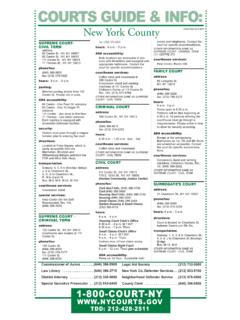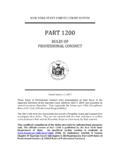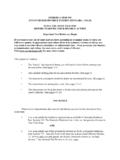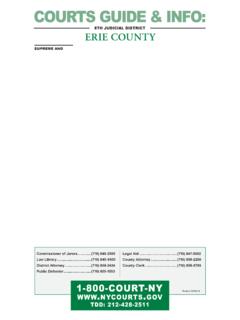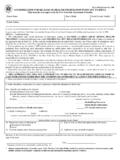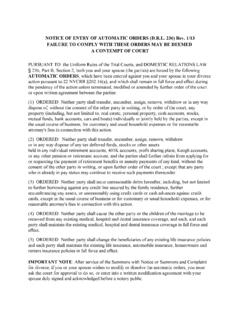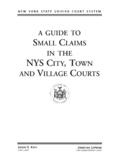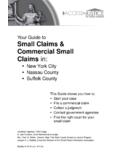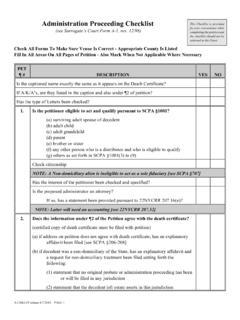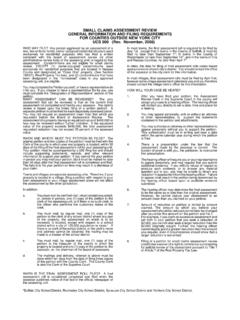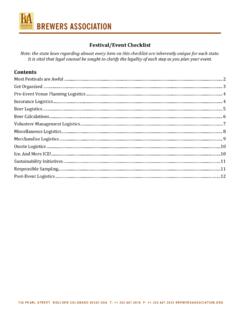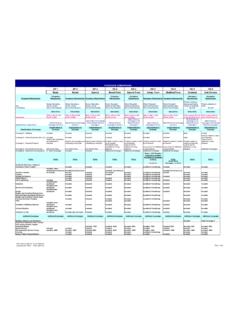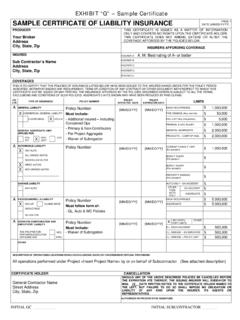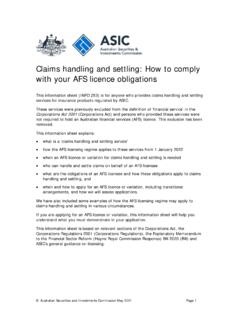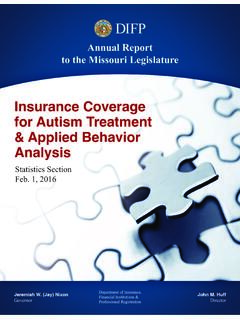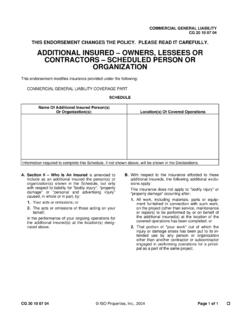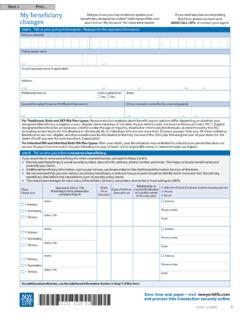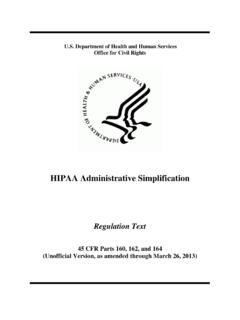Transcription of Court of Appeals State of New York before publication in ...
1 - 1 - State of New York Court of Appeals OPINION This opinion is uncorrected and subject to revision before publication in the New York Reports. No. 61 Morgan Securities Inc., et al., Appellants, v. Vigilant Insurance Company, et al., Respondents. Steven E. Obus, for appellants. Daniel M. Sullivan, for respondents Vigilant Insurance Company et al. Edward J. Kirk, for respondents Certain Underwriters at Lloyd's London et al. David F. Abernethy, for respondent Travelers Indemnity Company.
2 Securities Industry and Financial Markets Association, James Corcoran et al., amici curiae. DiFIORE, Chief Judge: This appeal involves a dispute between the insured securities broker-dealers and certain excess insurers concerning the availability of coverage under a wrongful act liability policy for funds the insureds disgorged as part of a settlement with the Securities - 2 - No. 61 - 2 - and Exchange Commission. We conclude that the settlement payment in question was not excluded from insurance coverage as a penalt[y] imposed by law under the policies at issue and therefore reverse.
3 In 2000, The Bear Stearns Companies purchased a primary insurance policy from defendant Vigilant Insurance Company providing coverage for wrongful acts of the Companies and its subsidiaries. The Bear Stearns Companies also purchased various excess insurance policies from defendants Travelers Indemnity Company, Federal Insurance Company, National Union Fire Insurance Company of Pittsburgh, Pa., Liberty Mutual Insurance Company, Certain Underwriters at Lloyd s London, and American Alternative Insurance Corporation or their predecessor entities that followed form to the policy issued by Vigilant.
4 As relevant here, the policies provided coverage for loss that Bear Stearns became liable to pay in connection with any civil proceeding or governmental investigation into violations of laws or regulations, defining loss as including various types of damages including compensatory and punitive damages ( where insurable by law ) but not fines or penalties imposed by law. In 2003, the Securities and Exchange Commission (SEC) and other regulatory agencies began investigating Bear, Stearns & Co. Inc. and Bear, Stearns Securities Corporation securities broker-dealers that processed and cleared trades for clients (collectively, Bear Stearns).
5 The investigation concerned allegations that, between 1999 and 2003, Bear Stearns had facilitated late trading and deceptive market timing practices1 1 Late trading is the practice of placing orders to buy, redeem or exchange mutual fund shares after the 4:00 close of trading, but receiving the price based on the net asset - 3 - No. 61 - 3 - by its customers in connection with the purchase and sale of shares of mutual funds. Bear Stearns notified the Insurers of the pending investigation, but the Insurers effectively disclaimed coverage (151 AD3d 632, 633 [1st Dept 2017]).
6 Eventually, the SEC informed Bear Stearns that it intended to commence a civil action or administrative proceeding charging violations of federal securities laws and that it would seek, among other things, $720 million in monetary sanctions. Although Bear Stearns disputed the proposed charges, in early 2006 it settled with the SEC. Pursuant to the settlement order, the SEC censured Bear Stearns and ordered it to cease and desist from any future securities law violations. Among other findings, the administrative settlement order stated that Bear Stearns facilitated late trading and the deceptive market timing activity of certain clients.
7 [W]ithout admitting or denying the findings and [s]olely for the purpose of these proceedings, Bear Stearns agreed to a $160 million disgorgement payment and a $90 million payment for civil money penalties. Both payments were to be deposited in a Fair Fund to compensate mutual fund investors allegedly harmed by the improper trading practices (see 15 USC 7246). Further, [t]o preserve the deterrent effect of the civil penalty, the settlement order directed that the $90 million payment but not the disgorgement payment was ineligible value set at the close of trading, which practice allows traders to obtain improper profits by using information obtained after the close of trading ( Morgan Sec.)
8 Inc. v Vigilant Ins. Co., 21 NY3d 324, 330 n 1 [2013]). Market timing is the practice of frequent buying and selling of shares of the same mutual fund or the buying or selling of mutual fund shares to exploit inefficiencies in mutual fund pricing ; although this is not per se improper, it can be deceptive if it induces a mutual fund to accept trades it otherwise would not accept under its own market timing policies (id.). - 4 - No. 61 - 4 - to offset any sums owed by Bear Stearns to private litigants injured by the trading practices.
9 Bear Stearns was also required to treat the $90 million payment as a penalty for tax purposes. Following the settlement, Bear Stearns transferred the $160 million disgorgement and $90 million penalty payments to the SEC. Bear Stearns also eventually settled a series of class actions brought on behalf of injured private investors based on similar late trading and market timing allegations. Plaintiffs, Bear Stearns successor companies,2 subsequently commenced this action alleging that the Insurers had breached the insurance contracts and seeking a declaration of coverage for the disgorgement payment, private settlement, and various other defense costs and expenses.
10 The Insurers moved to dismiss the complaint arguing, among other things, that the disgorgement component of the SEC settlement was not insurable as a matter of public policy. Supreme Court denied the motions to dismiss, but the Appellate Division reversed and granted the motions (91 AD3d 226 [1st Dept 2011]). On Bear Stearns appeal, we reinstated the complaint, concluding that the Insurers were not entitled to dismissal because the disgorgement payment, allegedly calculated in large measure on the profits of others, was not clearly uninsurable as a matter of public policy (21 NY3d 324, 336 [2013]).
